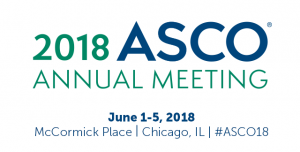 We always greatly anticipate the scientific and educational sessions presented at the American Society of Clinical Oncology (ASCO) annual meeting, this year being held in Chicago from June 1-5. The meeting is the largest of its kind focused on cancer, attracting more than 30,000 oncology professionals from around the world to discuss ”state-of-the-art treatment modalities, new therapies, and ongoing controversies in the field.”
We always greatly anticipate the scientific and educational sessions presented at the American Society of Clinical Oncology (ASCO) annual meeting, this year being held in Chicago from June 1-5. The meeting is the largest of its kind focused on cancer, attracting more than 30,000 oncology professionals from around the world to discuss ”state-of-the-art treatment modalities, new therapies, and ongoing controversies in the field.”
Based on this year’s announced program, here are a few of the areas that we think will be worth watching for some interesting news and discussions:
- Cell and Gene Therapies
Kite, now owned by Gilead, will be presenting updated data on the durability of response for patients with refractory large B-cell lymphoma who were treated with its CAR-T therapeutic, Yescarta® (axicabtagene ciloleucel) in the Phase 2 ZUMA-1 study. Back in December, researchers announced at the American Society for Hematology (ASH) meeting that with a minimum follow-up of one year after a single infusion of Yescarta (median follow-up of 15.4 months), 42 percent of patients continued to respond to therapy, including 40 percent with a complete remission. Gilead/Kite’s ASCO abstract suggests that these responses deepen over time, and that patients with a partial response can ultimately achieve a complete response as late as a year post-infusion.
But the ultimate winner between Gilead/Kite’s Yescarta and Novartis’ Kymriah is yet to be determined. Results of a small China study that looked at the two CAR-T treatments head-to-head suggest a possible advantage for Kymriah, which showed a 100% overall objective response rate (ORR) in patients with B-cell acute lymphocytic leukemia compared to 89% ORR for Yescarta. Moreover, all five of the patients experiencing serious Grade 3 or 4 cytokine release syndrome, the major toxicity measurement, were in the Yescarta-treated group, which is not a good sign for Gilead.
We are also looking forward to an update on the clinical results with bluebird bio’s BB2121 Anti-BCMA CAR-T therapy from its Phase 1 study in relapsed/refractory multiple myeloma. This product was the subject of a co-development and co-promotion deal between bluebird bio and Celgene in late March of this year. While this is only a Phase 1 study, the data so far have been promising. At a median of 40 weeks follow up, ORR in 18 evaluable patients was 94%, with 10 of 18 patients achieving a complete response, and 9 of 10 showing signs of minimal residual disease. Progression-free survival at six and nine months was 81% and 71% respectively. An additional five months of data from this trial will be presented at ASCO.
The CAR-T arena continues to be of major interest and considerable promise, but many questions remain. The current autologous therapies are very costly, in part due to the complex and time-consuming procedures needed to supply them for each patient. As result, reimbursement of such therapies remains an issue, raising questions of access to these cutting-edge treatments for most patients who might benefit. Newer approaches focused on “off-the-shelf” allogeneic therapies aim to address these issues of time and cost, but allogeneic CAR-Ts remain at a much earlier stage of development.
- New Data on Immuno-oncology (IO) Agents
Right now Keytruda® and Opdivo® remain the leaders in the field of IO therapeutics, where they have made gains against several tumor types, both on their own and in combination with other agents. We expect to hear more about such combination therapies at ASCO, but it’s hard to get a broad picture at this time given the large number of abstracts (265 on nivolumab, 276 on pembrolizumab alone). We’re also wondering if any new IO therapeutics, beyond PD-L1 inhibitors, might grab the spotlight this year.
- Loxo-292 — Tumor Agnostic Agent Among “Best of ASCO”
The morning after the ASCO abstracts were published, internet industry pundits were buzzing about an abstract featuring Loxo’s selective RET inhibitor, Loxo-292, and results of a Phase 1 study in RET-altered cancers. Loxo-292 showed a 69% ORR, which including a 65% response in non-small cell lung cancer, 83% response in papillary thyroid cancer, and 84% radiographically confirmed tumor reduction of 19 – 67%. Loxo’s chief executive officer says the data to be presented at ASCO is even better for this truly tumor-agnostic agent, which is being developed to treat a specific genetically defined patient population rather than a particular tumor type.
- Precision Medicine
Next-generation sequencing (NGS) has opened the field for biomarker discovery and the use of oncology biomarkers to help direct the right treatment to the right patient is gaining traction in the clinic. We see this as the continued move toward diagnostics dominance in the cancer field, something that we’ve been writing about for some time. Along with the use of NGS approaches and big data analytics, we expect to hear more about new liquid biopsy results, as the accuracy of these methods improve for both initial diagnosis and patient monitoring over time. Precision medicine in oncology will also be a focus for us immediately following ASCO, and we look forward to continuing the ASCO discussion at BIO2018, where we’ll be moderating a panel on June 6 on “The Future of Cancer: “Real-Time” Oncology.”
Are you headed to ASCO? We’d love to meet with you in Chicago to discuss any topics or projects of special interest to you and your company. Please let us know!